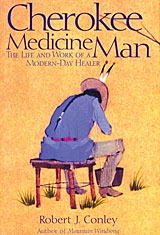 |
“I’ve written over fifty books. … None of them has ever given me the problems of this book,” admitted Robert Conley in the afterword to his latest work, Cherokee Medicine Man: The Life and Work of a Modern Day Healer (University of Oklahoma Press, 2005).
“Some people have said … that it’s because this book should never have been written,” Conley goes on. “I cannot agree with that, however, because it was Little Bear who initiated it.”
In fact, the book was a challenge not because of its author’s unwillingness to put pen to paper, but because of an ongoing series of mysterious events: Important subjects fell ill, or wouldn’t talk, or — most mysteriously — seemed unable to talk when Conley appeared with his tape recorder. And sometimes the tape recorder simply played back interviews as garbled nonsense.
Blame it on bad medicine.
Doctor, doctor, give me the news
Conley, a member of the Cherokee Nation, uses his book to reveal the world of the medicine man, following John Little Bear and interviewing those who came to the Cherokee healer. It’s territory rarely encountered by outsiders.
“I know anthropologists had talked to medicine men, but I don’t know how legitimate that is,” the writer imparts during a phone interview with Xpress. “Some swear these medicine men lied, and didn’t give away any secrets.”
Perhaps the greatest secret of all is just what, exactly, a medicine man is — because Conley himself is hard-pressed to offer a definition. “I didn’t get into that much in the book,” he says, “but in the Cherokee language, there are different names for different kinds of medicine people.” For example, some healers just “look into” a problem, and then send the patient on to another medicine man for a cure.
John Little Bear happens to be a multitasker. He serves as counselor, consultant, spiritual guide, pharmacist, shape-shifter and, on occasion, liaison to the spirit world. Going far beyond the typical house call, his doctoring often involves sweat lodges, herbal cures and cigarettes supercharged with prayers or songs.
“Indian medicine’s not witchcraft. It’s a complete different thing … Indian medicine is not done with, you know, black magic,” he tells Conley at one point in the book. “It’s done with the things that we was taught through the years. I can’t tell you how to do it or anything … cause we’d have everybody running around here as a medicine man.”
“The bad medicine that had been tormenting Frank had been put on his family, put in their blood, years earlier by medicine people who were no longer living,” Conley writes of one man’s struggles. There’s no pharmaceutical for bad blood; only a stringent belief in the medicine man’s ability to intervene will bring relief.
External medicine
So it’s not witchcraft at work — but the stories in Medicine Man bear resemblance to voodoo, where charms, fetishes, spells and curses hold magic power for adherents.
But Conley isn’t interested in cultural comparisons. “I suspect of any tribal culture that there are similarities,” he notes, pointing out the resemblance between the burial structures of ancient Egyptians and those of South Americans. “If you start stacking rocks, eventually you’ll get a pyramid.”
He adds, “One person’s religion is another person’s superstition.”
For him, it’s not a matter of proving or disproving Cherokee-medicine practices, but simply documenting his own heritage. “A few Cherokees are writing these days, but most have grown up away from the culture and are relying on [information] from the Bureau of Indian Affairs [part of the U.S. Department of the Interior], written by white men.
“I think that will change. I think it’s beginning.”
Conley’s newest work, The Cherokee Nation: A History, comes out in June. Though the book is touted as “the first to be endorsed by the Cherokee Nation,” the author clarifies that he was actually approached by the Cherokee Nation to do the work.
“If you could follow a straight line of history, if such a thing were possible, it would be an amazing story,” he says of the Cherokees’ legacy. “But of course, there are all these offshoots.”
This month, Conley retraces his own ancestry, leaving his home in Oklahoma to visit Western North Carolina (the original home of the Cherokee), where he’ll teach and promote his books. “It’s really special,” he says, “to be in a place where all the old tribal stories are supposed to have happened.”
Robert Conley joins Dr. Andrew Denson for a reading at Malaprop’s Bookstore (55 Haywood St.) on Saturday, May 21. Dr. Denson’s book is Demanding the Cherokee Nation: Indian Autonomy and American Culture. 7 p.m. Free. 254-6734.



Before you comment
The comments section is here to provide a platform for civil dialogue on the issues we face together as a local community. Xpress is committed to offering this platform for all voices, but when the tone of the discussion gets nasty or strays off topic, we believe many people choose not to participate. Xpress editors are determined to moderate comments to ensure a constructive interchange is maintained. All comments judged not to be in keeping with the spirit of civil discourse will be removed and repeat violators will be banned. See here for our terms of service. Thank you for being part of this effort to promote respectful discussion.